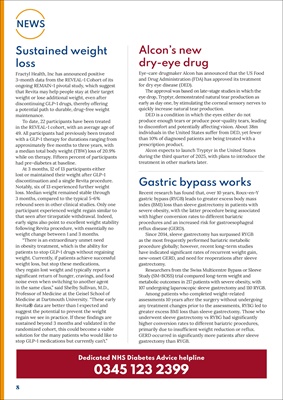
8
NEWS
Dedicated NHS Diabetes Advice helpline
0345 123 2399
Gastric bypass works
Recent research has found that, over 10 years, Roux-en-Y
gastric bypass (RYGB) leads to greater excess body mass
index (BMI) loss than sleeve gastrectomy in patients with
severe obesity, with the latter procedure being associated
with higher conversion rates to different bariatric
procedures and an increased risk for gastroesophageal
reflux disease (GERD).
Since 2014, sleeve gastrectomy has surpassed RYGB
as the most frequently performed bariatric metabolic
procedure globally; however, recent long-term studies
have indicated significant rates of recurrent weight gain,
new-onset GERD, and need for reoperations after sleeve
gastrectomy.
Researchers from the Swiss Multicentre Bypass or Sleeve
Study (SM-BOSS) trial compared long-term weight and
metabolic outcomes in 217 patients with severe obesity, with
107 undergoing laparoscopic sleeve gastrectomy and 110 RYGB.
Among patients who completed weight-related
assessments 10 years after the surgery without undergoing
any treatment changes prior to the assessments, RYBG led to
greater excess BMI loss than sleeve gastrectomy. Those who
underwent sleeve gastrectomy vs RYBG had significantly
higher conversion rates to different bariatric procedures,
primarily due to insufficient weight reduction or reflux.
GERD occurred in significantly more patients after sleeve
gastrectomy than RYGB.
Alcon's new
dry-eye drug
Eye-care drugmaker Alcon has announced that the US Food
and Drug Administration (FDA) has approved its treatment
for dry eye disease (DED).
The approval was based on late-stage studies in which the
eye drop, Tryptyr, demonstrated natural tear production as
early as day one, by stimulating the corneal sensory nerves to
quickly increase natural tear production.
DED is a condition in which the eyes either do not
produce enough tears or produce poor-quality tears, leading
to discomfort and potentially affecting vision. About 38m
individuals in the United States suffer from DED, yet fewer
than 10% of diagnosed patients are being treated with a
prescription product.
Alcon expects to launch Tryptyr in the United States
during the third quarter of 2025, with plans to introduce the
treatment in other markets later.
Sustained weight
loss
Fractyl Health, Inc has announced positive
3-month data from the REVEAL-1 Cohort of its
ongoing REMAIN-1 pivotal study, which suggest
that Revita may help people stay at their target
weight or lose additional weight, even after
discontinuing GLP-1 drugs, thereby offering
a potential path to durable, drug-free weight
maintenance.
To date, 22 participants have been treated
in the REVEAL-1 cohort, with an average age of
49. All participants had previously been treated
with a GLP-1 therapy for durations ranging from
approximately five months to three years, with
a median total body weight (TBW) loss of 20.9%
while on therapy. Fifteen percent of participants
had pre-diabetes at baseline.
At 3 months, 12 of 13 participants either
lost or maintained their weight after GLP-1
discontinuation and a single Revita procedure.
Notably, six of 13 experienced further weight
loss. Median weight remained stable through
3 months, compared to the typical 5-6%
rebound seen in other clinical studies. Only one
participant experienced weight regain similar to
that seen after tirzepatide withdrawal. Indeed,
early signs also point to excellent weight stability
following Revita procedure, with essentially no
weight change between 1 and 3 months.
"There is an extraordinary unmet need
in obesity treatment, which is the ability for
patients to stop GLP-1 drugs without regaining
weight. Currently, if patients achieve successful
weight loss, but stop these medications,
they regain lost weight and typically report a
significant return of hunger, cravings, and food
noise even when switching to another agent
in the same class," said Shelby Sullivan, M.D.,
Professor of Medicine at the Geisel School of
Medicine at Dartmouth University. "These early
Revita® data are better than I expected and
suggest the potential to prevent the weight
regain we see in practice. If these findings are
sustained beyond 3 months and validated in the
randomized cohort, this could become a viable
solution for the many patients who would like to
stop GLP-1 medications but currently can't."